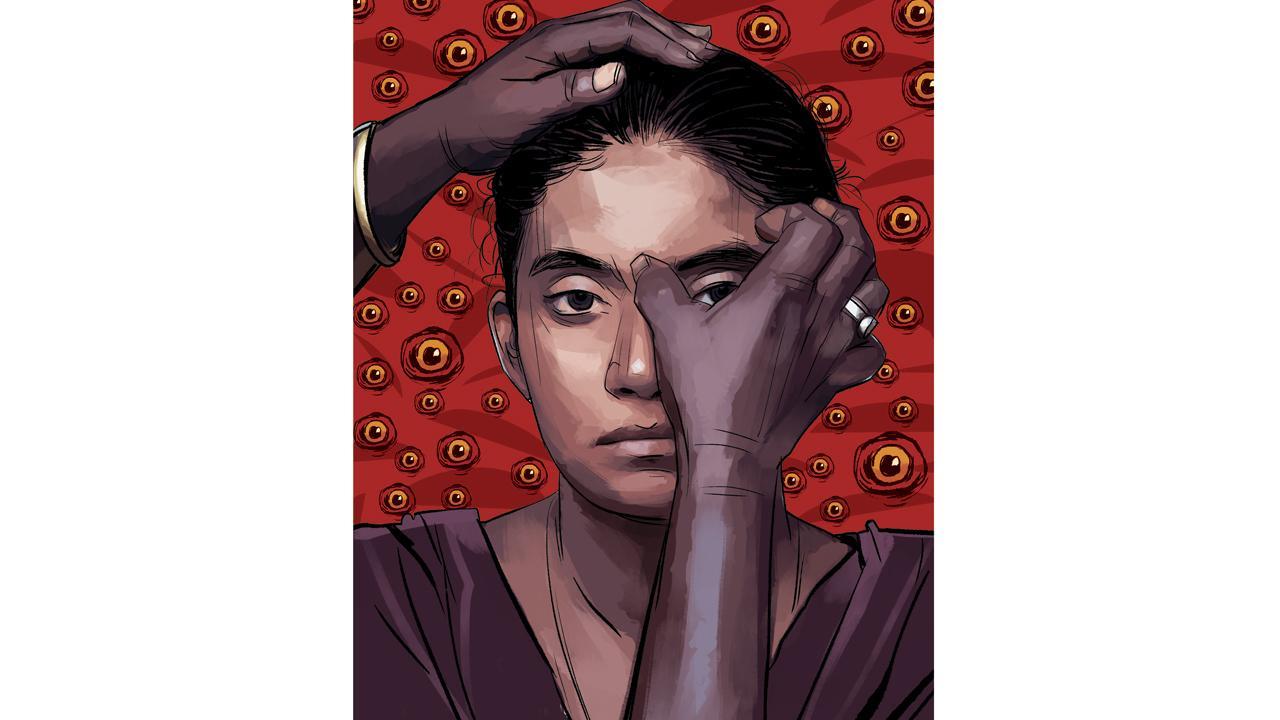Vinothraj’s screenplay and direction radiate assurance in this powerfully feminist film

Illustration/Uday Mohite
![]() PS Vinothraj's Kottukkaali (The Adamant Girl, Tamil), that had its world premiere and sold-out shows at the Berlin Film Festival last month, is a ferocious attack on many deep-rooted, misogynistic Indian traditions, including incest and child marriage, whose practice continues unabated. It is his second feature, following his absolutely compelling debut, Koozhangal (Pebbles, Tamil), that won the International Film Festival Rotterdam’s top Tiger Award. Kottukkaali features Pandi (Soori Muthuchamy, the Tamil actor who has done over 100 films, including Vetri Maaran’s Viduthalai (Liberation) 1 and 2, and Meena (the lovely Malayali actress Anna Ben, who has done about nine films, including Kumbalangi Nights—her Babymol is indelibly etched in our hearts—Helen and Kappela).
PS Vinothraj's Kottukkaali (The Adamant Girl, Tamil), that had its world premiere and sold-out shows at the Berlin Film Festival last month, is a ferocious attack on many deep-rooted, misogynistic Indian traditions, including incest and child marriage, whose practice continues unabated. It is his second feature, following his absolutely compelling debut, Koozhangal (Pebbles, Tamil), that won the International Film Festival Rotterdam’s top Tiger Award. Kottukkaali features Pandi (Soori Muthuchamy, the Tamil actor who has done over 100 films, including Vetri Maaran’s Viduthalai (Liberation) 1 and 2, and Meena (the lovely Malayali actress Anna Ben, who has done about nine films, including Kumbalangi Nights—her Babymol is indelibly etched in our hearts—Helen and Kappela).
Spoiler alert: In Kottukkaali, which played in the Forum section of the Berlinale, Vinothraj torpedoes the horrific practice common in South India, and elsewhere, of young girls being coerced/brainwashed into marrying their own maternal uncles (horrors!), with much of the town publicly celebrating the incest. Like Pebbles, Kottukkaali, too, is inspired by misogyny experienced by Vinothraj’s family. Soori’s and Meena’s relationship is explored under the weight of many forms of misogyny. Pandi (Soori), who was “promised” Meena (Anna Ben) in marriage when she was a kid, is furious that as a grown woman, she dares to fall in love with another man. The film is a road movie, during which Pandi’s and Meena’s families pile into a rickshaw and onto bikes, to visit a distant exorcist, in order to “exorcise” Meena’s lover and “delete” him from her life—so Pandi can presumably “insert” himself into her heart. A woman is merely a man’s mechanical toy, a plaything that can be “fixed”, and love is a replaceable battery. It’s Eternal Sunshine Of The Spotless Mind gone awry— but the attempt to “delete memories” of her lover is done forcibly and without her consent. Spoiler alert ends.
Vinothraj’s screenplay and direction radiate assurance in this powerfully feminist film. He daringly takes on multiple villains—incest, child marriage, the caste system, and religious superstition serving regressive social traditions. Indeed, the older women, having internalised patriarchy, scold Soori for having “allowed” Meena to study; now she has ideas of independence. The writer employs a fairly obvious metaphor for Meena, of an accompanying rooster, whose feet are always tied, and whose fate is to be ritually sacrificed. Soori is in fine form as a man who feels the girl he was promised in marriage has wronged him. He seethes with coiled rage and has an explosive presence. There is a scene in which terrible violence is inflicted upon Meena and the women relatives, that is hard to watch. Anna Ben, who has barely a line in the entire film, has a powerful presence as Meena: throughout the film, she responds to the relentless humiliation and violence with a steely gaze that is both stoic and defiant; she weaponises silence. They can torture her body, but they cannot tame her spirit: she remains resolutely “unattainable”. We never see her lover; only a ring. There’s hardly any music in the film either; Vinothraj himself uses silence effectively.
B Sakthivel’s cinematography is strong, and the film opens with an impressive, six-minute long, one-take shot, in which a middle-aged woman bathes at daybreak, visits a temple nearby, prays and returns home to her stoic daughter Meena. Even in a 100-minute film, editor Ganesh Siva allows for longueurs, with endless trundling along village roads; the crux of the story arrives about an hour into the film. But a sharp cut at the climax, involving a revelation to Pandi, following an exorcising ritual, is damning and forceful as a tight slap.
Suren G and S Alagia Koothan’s sound design is effective. The women crew includes Executive Producer Banu Priya. Congratulations to the team, including producer—and actor—Sivakarthikeyan, and co-producer Kalai Arasu P, for backing this film, a powerful indictment of Indian society, that holds up a mirror to it as well.
Meenakshi Shedde is India and South Asia Delegate to the Berlin International Film Festival, National Award-winning critic, curator to festivals worldwide and journalist.
Reach her at meenakshi.shedde@mid-day.com
 Subscribe today by clicking the link and stay updated with the latest news!" Click here!
Subscribe today by clicking the link and stay updated with the latest news!" Click here!








